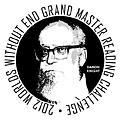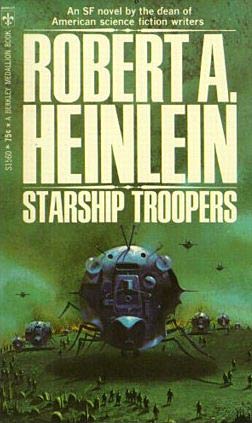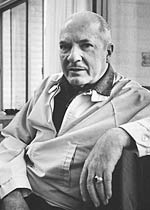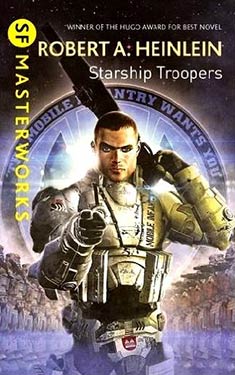GMRC Review: Starship Troopers by Robert A. Heinlein
 Guest Blogger and WWEnd Member, Charles Dee Mitchell, has contributed a great many book reviews to WWEnd including his blog series Philip K. Dickathon and The Horror! The Horror! He can also be found on his own blog www.potatoweather.blogspot.com. This is Dee’s sixth GMRC review to feature in our blog.
Guest Blogger and WWEnd Member, Charles Dee Mitchell, has contributed a great many book reviews to WWEnd including his blog series Philip K. Dickathon and The Horror! The Horror! He can also be found on his own blog www.potatoweather.blogspot.com. This is Dee’s sixth GMRC review to feature in our blog.
 My Junior high school library had a copy of Starship Troopers on the shelf. I never read it. I had read some of the Robert Heinlein juveniles, and I think I assumed Troopers was another. I had also read a paperback copy of The Puppet Masters, which was one of my first forays into genuinely adult SF and of course I loved it. But I loved monsters more than military, and so Troopers never caught my attention although I loved that first quote, “Come on, you apes. You want to live forever?”
My Junior high school library had a copy of Starship Troopers on the shelf. I never read it. I had read some of the Robert Heinlein juveniles, and I think I assumed Troopers was another. I had also read a paperback copy of The Puppet Masters, which was one of my first forays into genuinely adult SF and of course I loved it. But I loved monsters more than military, and so Troopers never caught my attention although I loved that first quote, “Come on, you apes. You want to live forever?”
Soon I quit reading science fiction in general and I got the word that Heinlein was the bully pulpit for the military establishment. Boo. Hiss. So I was was surprised that the novel was not nearly so jingoistic as I expected. I think it would have defeated me, however, in seventh grade. Despite the good action and cool bugs, that middle section of officer training school would have done me in.
 A couple of reviews I read emphasized that the novel should not be confused with what the reviewers obviously considered the vastly inferior Paul Verhoeven 1997 film version. These reviewers must be the true believers. I loved the movie when I first saw it and thoroughly enjoyed it watching it again after reading the novel the other day. Verhoeven passes Heinlein’s text through the deconstructionist mill. (Did Michel Foucault get a consulting credit?) I’ve already said the novel did not strike me as the jingoistic broadside I anticipated, but what fun to see these minor celebrities giving their severely limited all to this high-gloss parody of everything Heinlein must have held dear. There is a rumor that the actors, few of whom were the sharpest pencils in the studio box, had no idea they were being made fun of. I think that like most young actors with few credits to their names they were more interested in their paychecks than in the socio-political implications of their characters.
A couple of reviews I read emphasized that the novel should not be confused with what the reviewers obviously considered the vastly inferior Paul Verhoeven 1997 film version. These reviewers must be the true believers. I loved the movie when I first saw it and thoroughly enjoyed it watching it again after reading the novel the other day. Verhoeven passes Heinlein’s text through the deconstructionist mill. (Did Michel Foucault get a consulting credit?) I’ve already said the novel did not strike me as the jingoistic broadside I anticipated, but what fun to see these minor celebrities giving their severely limited all to this high-gloss parody of everything Heinlein must have held dear. There is a rumor that the actors, few of whom were the sharpest pencils in the studio box, had no idea they were being made fun of. I think that like most young actors with few credits to their names they were more interested in their paychecks than in the socio-political implications of their characters.
Book and film should absolutely be absorbed as a single experience. Probably the book should be read first, just so you do not have to picture Casper Van Diehm in the leading role until the last possible moment.
Starship Troopers
Very few science fiction novels have aroused such controversy over the decades as Starship Troopers by Robert A. Heinlein. This militaristic epic, winner of the 1960 Hugo Award, has been accused not merely of glorifying military values but of endorsing fascism to the point that one could say that the Terran Federation is analogous to Nazi Germany. An extreme analysis of course, which in our post-modernist world is terribly unfair, but there is no denying that Starship Troopers is indeed a pseudo-Darwinian rationale for an endless inter-species war of all against all. The novel, as it stands accused by many critics, rapidly degenerates into a series of lectures about politics, history and philosophy by way of various mouthpieces; and reverberates “that Heinlein voice.”
Oddly, I still found it compelling and stimulating, taking an interest in its political and moral philosophy rather than being converted to what is advocated in the text. It’s actually quite far from the fascism it is accused of. Anyone who can understand the oath may serve, regardless of their attributes or abilities. There are no wars within the human species, with lots of personal freedom, where almost everyone is reasonably well off and people who despise the government can do so openly and fearlessly.
A student of history will notice that the communal ideology of the alien “Bugs” is virtually identical to Western Cold War understanding of Communism and the Soviet Union. There is a delightful, explicit critique of Marxism as Rico concludes at one point:
“We were learning, expensively, just how efficient a total Communism can be when used by a people adapted to it by evolution; the Bug commissars didn’t care any more about expending soldiers than we care about expending ammo.”
Virulent anti-Communist! Undoubtedly right-wing in its politics and unashamedly militaristic but also one of the finest coming-of-age narratives in science fiction. We follow Rico’s rites of passage, making many mistakes along the way, and contrary to a glorifying view of war, avoiding blind heroism. (Don’t ever confuse the book with the movie sharing the same name!)
It is undeniably a significant work in the history of the genre, pioneering an entire sub-genre of military space opera, even if only paradoxical in that many, like Joe Haldeman and Orson Scott Card, have written fiction in conscious opposition to the philosophy espoused in Starship Troopers.
“To the everlasting glory of the infantry…”



















 Full Details
Full Details


